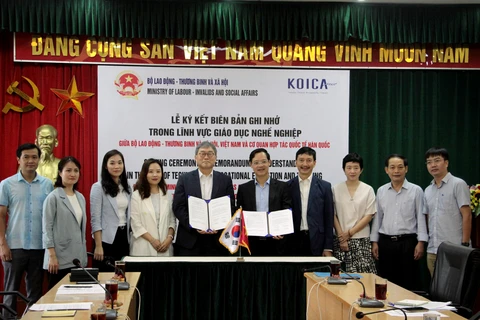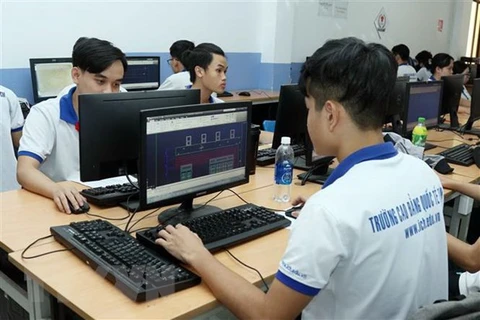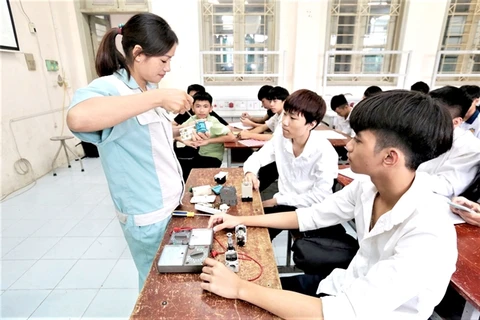HCM City (VNA) – The German development agency Deutsche Gesellschaft für Internationale Zusammenarbeit (GIZ), in cooperation with the Directorate of Vocational Education and Training and the Departments of Labour, Invalids and Social Affairs in eight cities and provinces, will offer short training courses for 1,000 workers affected by the COVID-19 pandemic.
Target trainees are unemployed persons or underemployed workers at high risk of losing their job due to COVID-19 in HCM City, Nha Trang City and Bac Ninh, Ha Tinh, Ninh Thuan, An Giang, Dong Nai and Long An provinces.
The two-month training courses, starting this month, will focus on industrial occupations which are more resilient to the impact of COVID-19 compared to sectors such as tourism, hospitality or textiles.
The selected occupations include mechanics, industrial electrics and electronics, plumbing, building electronics, and automotive and wastewater treatment.
The training programmes for these occupations have been piloted at 11 technical vocational education and training (TVET) institutes since 2017 within the scope of the Vietnamese-German programme “Reform of TVET in Vietnam”.
“These demand-oriented programmes follow a modular approach and are based on German standards. They can be quickly adjusted into short-term training courses and disseminated by the TVET institutes,” said Nguyen Phan Anh Quoc, Rector of Ninh Thuan Vocational College, one of the TVET institutes offering the courses.
“The courses are offered by well-trained and highly competent teachers using modern machines supported by the German development cooperation,” Quoc said.
“The short-term courses rapidly equip trainees with technical skills and allow them to return to employment and thus improve their livelihoods. A well-trained labour force will also significantly help companies contribute to economic recovery," said Dr. Juergen Hartwig, GIZ programme director.
Besides free tuition, trainees will also be supported with food, travel and an accommodation allowance. After successful completion of training, they will be granted a certificate.
According to a recent survey by the General Statistic Office, the number of employed workers has seen the largest drop in the last 10 years.
As of June, 30.8 million persons aged 15 and above in the country had been negatively affected by COVID-19, including those who lost their jobs, were laid off temporarily or had to take turns with others, had their work hours reduced, or had their income cut./.
Target trainees are unemployed persons or underemployed workers at high risk of losing their job due to COVID-19 in HCM City, Nha Trang City and Bac Ninh, Ha Tinh, Ninh Thuan, An Giang, Dong Nai and Long An provinces.
The two-month training courses, starting this month, will focus on industrial occupations which are more resilient to the impact of COVID-19 compared to sectors such as tourism, hospitality or textiles.
The selected occupations include mechanics, industrial electrics and electronics, plumbing, building electronics, and automotive and wastewater treatment.
The training programmes for these occupations have been piloted at 11 technical vocational education and training (TVET) institutes since 2017 within the scope of the Vietnamese-German programme “Reform of TVET in Vietnam”.
“These demand-oriented programmes follow a modular approach and are based on German standards. They can be quickly adjusted into short-term training courses and disseminated by the TVET institutes,” said Nguyen Phan Anh Quoc, Rector of Ninh Thuan Vocational College, one of the TVET institutes offering the courses.
“The courses are offered by well-trained and highly competent teachers using modern machines supported by the German development cooperation,” Quoc said.
“The short-term courses rapidly equip trainees with technical skills and allow them to return to employment and thus improve their livelihoods. A well-trained labour force will also significantly help companies contribute to economic recovery," said Dr. Juergen Hartwig, GIZ programme director.
Besides free tuition, trainees will also be supported with food, travel and an accommodation allowance. After successful completion of training, they will be granted a certificate.
According to a recent survey by the General Statistic Office, the number of employed workers has seen the largest drop in the last 10 years.
As of June, 30.8 million persons aged 15 and above in the country had been negatively affected by COVID-19, including those who lost their jobs, were laid off temporarily or had to take turns with others, had their work hours reduced, or had their income cut./.
VNA























